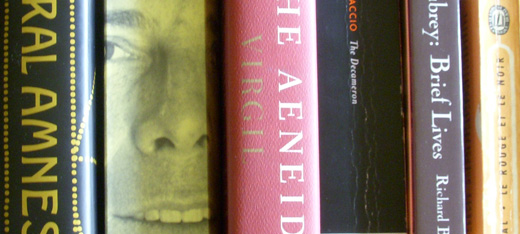FridayMorning Read
A bit of cheating. I haven’t been reading this morning. I haven’t even been at home. My attempt to launch a truncated Morning Read yesterday came to nothing; having done the reading, I took a nap, and when I woke up there were too many pre-wedding matters to attend to to write anything up.
No Merrill and no Aubrey today. But I did finish the third quarter of the Decameron, and Book X of the Aeneid. Although I’ll be very proud of myself when I finish with Boccaccio (for the time being), I could go on reading his saucy tales forever. Virgil’s epic, on the contrary, can’t be done with soon enough. And although I’ll be glad to have done with the adventures, shambolically related, of Julien Sorel, I’ve ordered a copy of La chartreuse de Parme from Amazon in France. I bought my copy of Le rouge et le noir, which I’m finally reading for the first time in 2008, in 1973, but if I haven’t started with the other big Stendhal book within a fifth of that interval, I’ll give it the heave-ho.
¶ The seventy-fifth story in the Decameron (VIII, v) is the first one that I would think to call “icky.” A smart aleck from two tales ago reappears and instigates a cloddish stunt that doesn’t work unless you have a good working knowledge of Fourteenth- Century apparel. An explanatory note would have been helpful, but it wouldn’t change the fact that this is the sort of trick that schools are right to punish.
¶ In the Aeneid, I read through to the end of Book X, just to get it over with. The battles, as depicted by Virgil, seem more like a bar brawl than warfare; the poem does not stoop to mention the rank and file.
¶ Ha! In Le rouge et le noir, the chapter entitled “L’Ennui” is the first in quite a while that isn’t tedious; in fact, it’s full of comic developments, starting off with the Maréchale’s idea that this bright new correspondent of hers (Julien) really ought to be a priest — a vicar-general, say. Her concern turns out to have little or no grounding in piety, but in every way reflects her status as a parvenue. She actually resorts to writing back to Julien, something that his scheme of “Russian letters” does not contemplate. He certainly can’t be bothered to read them; and when Mathilde discovers the pile of envelopes with intact seals she falls at his feet. Okay, you had to be there. But I enjoyed it, which made a nice change.
¶ As you might expect — if, like me, you began reading Cultural Amnesia in the middle (the letter “H,” to be exact) — Clive James is pretty hard on Jorge Luis Borges for overlooking the outrages of the Argentinian Junta.
In 1983, aftger the junta fell, he was finally forced into acceptance of plebeian democracy, the very thing he had always detested. A decade of inhernal anguish for his beloved country had a last tuaght him that state terror is more detestable still. It was a hard lesson for a slow pupil.
James’s principle objection is to Borges’s idea that, because the artist is a citizen of the whole world, he needn’t trouble with the affairs of any particular nation. Borges quotes Melville; interestingly, James doesn’t think much of Moby-Dick.

